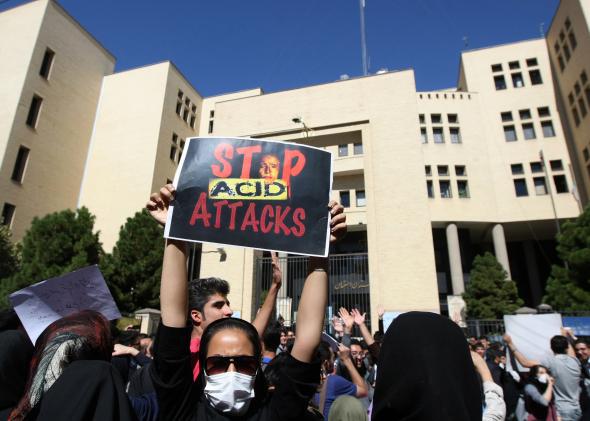The execution last Saturday of Reyhaneh Jabbari, a 26-year-old Iranian woman who killed a man she said was trying to rape her, appears to be more of a trend than a deviation from the norm. According to the latest findings from the UN’s special rapporteur on human rights in Iran, executions have surged in the country while conditions for women have worsened. Shaheed says 852 people were executed in Iran between July 2013 and June 2014. The New York Times’ write-up of the report notes that the “death penalty can be applied in Iran for adultery, recidivist alcohol use, drug possession and trafficking, as well as crimes in which a person ‘points a weapon at members of the public to kill, frighten and coerce them.’ ”
Iran has also seen a recent spate of attacks in which assailants fling acid in women’s faces they feel aren’t properly veiled. These attacks have prompted public outrage, and the government has vowed to crack down on them. But as the L.A. Times reports, some activists “believe that the government helped set the stage for attacks against those deemed immodest in some way by enacting a parliamentary measure providing protection to citizens who act on their own to help enforce the country’s strict social mores.” Iranian officials have also accused the international media of exaggerating the attacks and have muzzled domestic media coverage of them. Meanwhile, Washington Post reporter Jason Rezaian is still in jail without any formal charges.
All of this is happening at the same time as ongoing talks over Iran’s nuclear program. While there’s reportedly still a lot of work to be done for a comprehensive agreement to be reached before the Nov. 24 deadline, the talks have thus far exceeded expectations. At the very least, a military confrontation over Iran’s nukes, which seemed like a possibility just a few years ago, now seems very unlikely. The rise of ISIS has also brought the U.S. and Iran together, albeit tentatively, in the hope of stopping a common enemy.
All of this confirms what’s been evident for some time now: President Hassan Rouhani, who took over from Mahmoud Ahmadinejad last year, has lived up to his billing as a “moderate” in terms of Iran’s diplomatic relations with Western countries, but this hasn’t translated into more moderate domestic policies.
Early in his term, Rouhani tried to link the two issues, arguing that political reforms and human rights measures would accompany better relations with the West. But so far, the opposite seems to be happening. Ahmed Shaheed, the UN’s special rapporteur, suggests that Rouhani has only “limited authority” over the country’s judiciary. The president was unsuccessful in his efforts to rescind Jabbari’s death sentence.
U.N. human rights chief Navi Pillay, among others, has said that the human rights situation in Iran should be tied in some way to the nuclear talks. For what it’s worth, though, Iranian civil society activists seem to, by and large, support the negotiations.
There aren’t any signs that the U.S. has backed off its criticism of Iran’s human rights record—the State Department was quick to condemn Jabbari’s execution, for instance—but the UN’s Shaheed expressed worry this week that Iran “would use the nuclear issue as a ‘positive front’ while allowing human rights to become a ‘backwater.’ ”
It seems possible at this point that a major part of the legacy of the Obama and Rouhani administrations could be friendlier relations between Iran and the U.S. But it’s looking a lot less likely that this will result in Iran being a significantly freer society.
